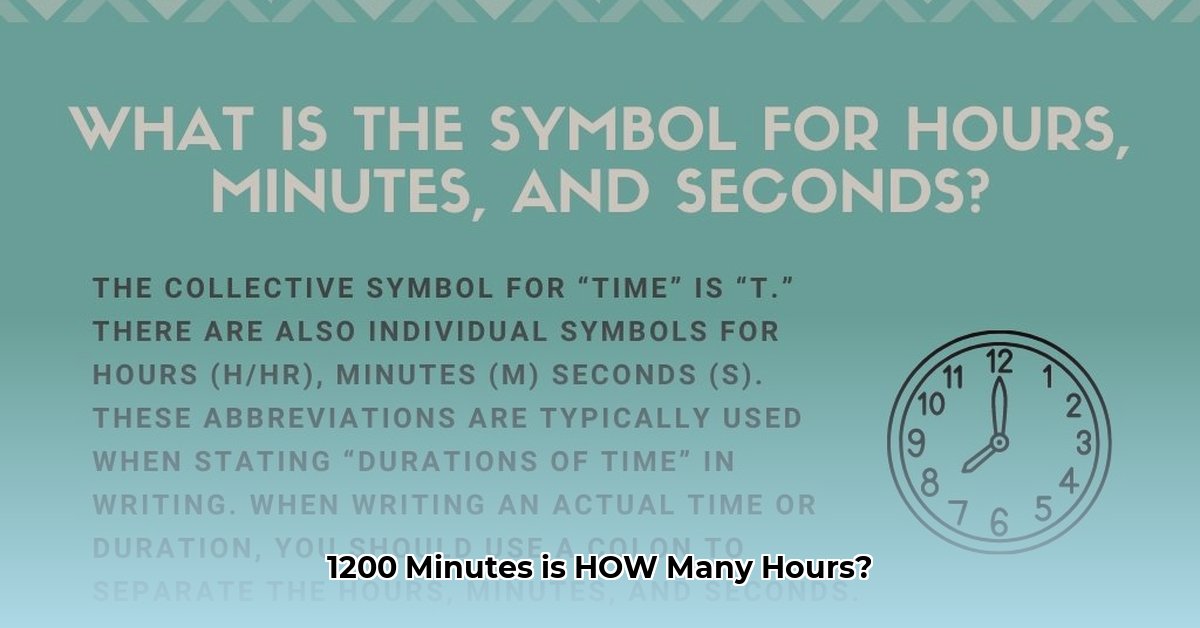1200 minutes = 20 hours.
How to Convert 1200 Minutes to Hours
Converting minutes to hours relies on a fundamental principle: there are 60 minutes in every hour. Therefore, to convert any number of minutes to hours, you simply divide by 60.
In this case: 1200 minutes / 60 minutes/hour = 20 hours.
Defining Minutes and Hours
A minute is a unit of time equal to 60 seconds. An hour is a unit of time equal to 60 minutes, or 3600 seconds. These definitions are based on the International System of Units (SI).
Conversion Table: Minutes to Hours (Near 1200)
| Minutes | Hours |
|---|---|
| 1180 | 19.67 |
| 1190 | 19.83 |
| 1200 | 20 |
| 1210 | 20.17 |
| 1220 | 20.33 |
Practical Applications of 20 Hours
Twenty hours is a significant amount of time. It’s roughly equivalent to:
- A transatlantic flight.
- A full day plus four additional hours.
- The time some experts suggest is needed to gain basic proficiency in a new skill.
Alternative Conversion Methods
While the formula is straightforward, online calculators and spreadsheet software can also perform these conversions quickly.
The Science and Perception of Time
While 1200 minutes objectively equals 20 hours, our perception of this duration can vary. Factors like our emotional state, the activities we’re engaged in, and even our age can influence how long or short a period of time feels. For instance, 20 hours spent waiting for something may feel significantly longer than 20 hours spent engaging in a favorite hobby. This subjective experience of time is a complex area of ongoing research. Studies suggest that our brains don’t process time in a purely linear fashion, and numerous factors might contribute to distortions in time perception.
Further research is exploring the neural mechanisms underlying our sense of time. Some experts believe that specific areas of the brain, like the prefrontal cortex and the cerebellum, play key roles in how we perceive and track the passage of time. Other theories suggest that our internal biological clocks, which regulate our circadian rhythms, may also influence our experience of time.
The Significance of Context
The context in which these 20 hours occur also matters. Twenty hours of work will likely feel different than 20 hours of leisure time. Understanding this context is crucial for effective time management and planning. For example, if a task is estimated to take 1200 minutes (20 hours), a project manager might break it down into smaller, more manageable segments. This might involve assigning different portions of the task to different team members, scheduling breaks, or incorporating buffer time to account for unexpected delays. In the context of travel, 1200 minutes translates to a substantial journey, requiring careful planning and preparation. Recognizing the context—a long flight, a road trip, an extended train ride—allows for informed decision-making regarding logistics, accommodations, and potential travel disruptions.
Time Conversion: A Valuable Tool
Understanding how to convert between minutes and hours, such as recognizing that 1200 minutes equals 20 hours, empowers us to effectively manage our time. While technology provides convenient shortcuts, understanding the underlying principles of time measurement enhances our ability to plan, schedule, and navigate our daily lives and long-term goals. Even in an age of digital clocks and instant conversions, grasping the fundamental relationship between minutes and hours remains a useful and practical skill.
- Cool Apps for Android Tablet for Creativity, Fun, and Productivity - February 13, 2026
- Must-Have Great Apps for Tablets to Get More Done - February 12, 2026
- Best Android Apps to Buy That Are Worth the Money - February 11, 2026










